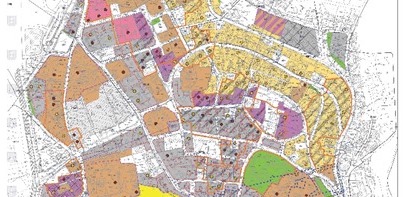Committee Accepts Parts of the Objection to the City Center Plan and Rejects Others

The City Center Plan Objections’ Committee issued its final decision regarding the plan for 101 – 0465229 through approving some of the objections presented by the Arab Center for Alternative Planning (ACAP) and the Jerusalem Center for Legal Aid and Human Rights (JLAC), representing the Jerusalem Human Rights Consortium (JHRC) which is a coalition of four leading Palestinian human rights organizations in Jerusalem – The Jerusalem Legal Aid and Human Rights Centre (JLAC), The Society of St. Yves, The Land Research Centre (LRC), and the Women’s Centre for legal Aid and Counselling (WCLAC).
The committee's decision, accepted ACAP and JLAC’s objection concerning adding floors to existing buildings in the Sultan Suleiman Street and Salah Eldin Street areas, the committee, in its response, highlighted the necessity of studying the feasibility of adding floors up to the height of the Old City walls. The committee justified this consideration by pointing to the presence of historical building in the area. Additionally, the committee mentioned that it assures that adding buildings to this facade could stimulate economic development, facilitating the improvement of building facades.
Inaddition to this area, the committee affirmed in its response to the ACAP and JLAC’s objection regarding proposed building heights that it is acceptable within the plan to allow construction higher than initially proposed. The committee specified that in the residential area designated in the plan for Wadi Joz (between Khaled ibn Al Walid Street in the north, Al Yaakobi, and Al Hariri Street in the south, Al Maqdisi to the east, and Hatem Atai to the west), construction up to 5 floors will be possible, with detailed specifications to be provided in advanced stages.
In addition, the committee rejected any expropriation from public areas mentioned in the plan. It addressed ACAP and JLAC’s claim that Article 6.16, "Expropriation for Public Needs," would lead to harm to residents’ property rights, public community institutions, including religious buildings and private schools, and structures providing various health services. The committee clarified, that based on consultations with the local committee, that the expropriation clause in the plan is a general provision indicating areas designated for public needs, with no intention to allow the expropriation of private institutions operating in the area for many years.
Conversely, the committee rejected the ACAP and JLAC’s objection regarding the future needs for current schools and the importance of the plan to include additional classrooms and expansions for schools in the City Center area. The committee dismissed the claim that the plan ignores the significance of developing educational facilities and expanding existing schools in the region, asserting that the plan provides additional rights in land allocated for public and educational buildings, both on municipal and private lands.
and private lands.

